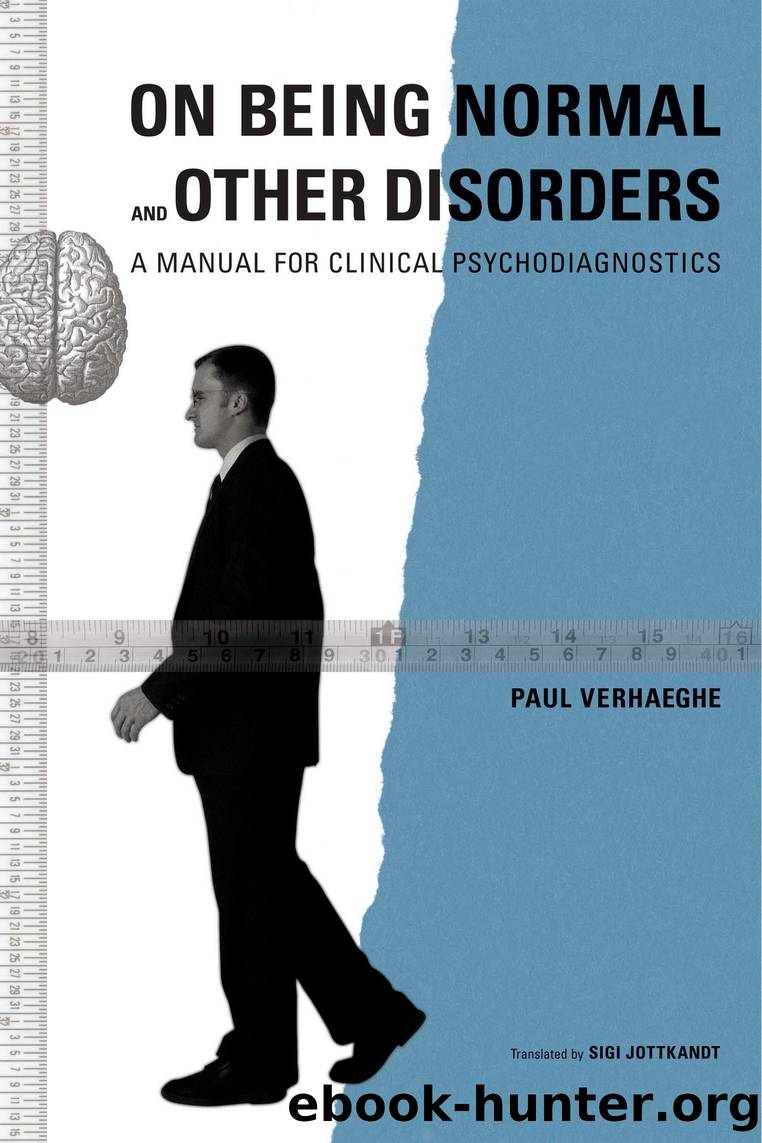On Being Normal and Other Disorders by Paul Verhaeghe

Author:Paul Verhaeghe [Verhaeghe, Paul]
Language: eng
Format: epub
Publisher: Other Press
Published: 2020-10-20T00:00:00+00:00
10
Conclusion: The Subjectâs Position in Relation to Anxiety, Guilt, and Depression
In the previous chapter we discussed the question of etiology in terms of the bigger picture. Were we to ask the same question at the level of the subject, we would inevitably come up against the problem of guilt, as we already saw in the conclusion to Part 1. By way of concluding Part II, we here take up the question of guilt again, this time in the light of our metapsychology. As we will see, it has everything to do with two central clinical phenomena: anxiety and depression.
The importance of these phenomena in the contemporary clinic scarcely needs stating. At the end of the day, one finds no form of psychopathology without some feelings of depression and/or anxiety. Before the hype of the personality disorders, it seemed as if the DSM diagnostic would almost exclusively be based on these feelings. While anxiety has always been at the center of clinical work, depression seems to have recently increased exponentially to become a âsign of the timesâ (Roudinesco 1999). This ubiquity requires us to comprehend these two phenomena both from a global perspective and as differentiated within the different pathologies.
In what follows, I will show how anxiety and depression are central to subject-formation and that potential psychopathological effects have to do with the way they areâor are notâprocessed in relation to the Other. We have seen both of them already at work from the outset of identity formation (in Chapter 6). Following on from this, it will become clear how each is connected with another central clinical phenomenon, namely, guilt. Given its high incidence in the clinic, it is strange that guilt has not received as much attention as the other two states. Its relative absence in contemporary studies stands in stark contrast to the ubiquity of depression.
My thesis will be that anxiety, guilt, and depression present a triptych in every relation between the subject and the Other. As such, they are unavoidable existential elements of identity formation, and hence also of clinical diagnostics.
Download
This site does not store any files on its server. We only index and link to content provided by other sites. Please contact the content providers to delete copyright contents if any and email us, we'll remove relevant links or contents immediately.
| Administration & Medicine Economics | Allied Health Professions |
| Basic Sciences | Dentistry |
| History | Medical Informatics |
| Medicine | Nursing |
| Pharmacology | Psychology |
| Research | Veterinary Medicine |
Periodization Training for Sports by Tudor Bompa(8250)
Why We Sleep: Unlocking the Power of Sleep and Dreams by Matthew Walker(6694)
Paper Towns by Green John(5175)
The Immortal Life of Henrietta Lacks by Rebecca Skloot(4571)
The Sports Rules Book by Human Kinetics(4377)
Dynamic Alignment Through Imagery by Eric Franklin(4205)
ACSM's Complete Guide to Fitness & Health by ACSM(4049)
Kaplan MCAT Organic Chemistry Review: Created for MCAT 2015 (Kaplan Test Prep) by Kaplan(3998)
Introduction to Kinesiology by Shirl J. Hoffman(3764)
Livewired by David Eagleman(3762)
The Death of the Heart by Elizabeth Bowen(3602)
The River of Consciousness by Oliver Sacks(3598)
Alchemy and Alchemists by C. J. S. Thompson(3509)
Bad Pharma by Ben Goldacre(3420)
Descartes' Error by Antonio Damasio(3270)
The Emperor of All Maladies: A Biography of Cancer by Siddhartha Mukherjee(3140)
The Gene: An Intimate History by Siddhartha Mukherjee(3091)
The Fate of Rome: Climate, Disease, and the End of an Empire (The Princeton History of the Ancient World) by Kyle Harper(3055)
Kaplan MCAT Behavioral Sciences Review: Created for MCAT 2015 (Kaplan Test Prep) by Kaplan(2979)
